At its core, a hydraulic press achieves immense strength by using an incompressible fluid to multiply force. This isn't magic; it's the practical application of a fundamental physics principle known as Pascal's Law. A small force applied to a small area generates pressure that is transmitted equally throughout the fluid, acting on a much larger area to produce a massive output force.
The secret to a hydraulic press is not creating energy, but trading distance for force. By pushing a small piston a long way, you can make a large piston move a short way with incredible power.

The Core Principle: Pascal's Law Explained
To understand the power of a hydraulic press, you must first understand the environment it creates and the law it exploits. The entire system is built around controlling pressure within a sealed system.
A Contained, Incompressible Fluid
Hydraulic systems are filled with a fluid, typically oil, that is nearly incompressible. This is a critical property.
When you push on this fluid, it doesn't shrink or absorb the pressure. Instead, it instantly transmits that pressure to every other part of the container it's in.
Pressure is Constant
This brings us to Pascal's Law, which states that a change in pressure at any point in an enclosed fluid is transmitted undiminished to all points throughout the fluid.
Think of squeezing a sealed water bottle. The pressure you apply with your hand is felt equally by the water molecules at the top, bottom, and all sides of the bottle.
The Equation of Power (P = F/A)
The relationship that governs this entire process is simple: Pressure equals Force divided by Area (P = F/A).
This means that a given amount of pressure can be created by a small force over a small area or a large force over a large area. This is the key that unlocks force multiplication.
How Force Multiplication Actually Works
The genius of the hydraulic press lies in its two-piston design, which leverages the P = F/A relationship to its advantage.
The Two-Piston System
A basic hydraulic press has two pistons of different sizes in a shared, sealed cylinder filled with hydraulic fluid.
- The input piston (or plunger) has a small surface area (A1).
- The output piston (or ram) has a much larger surface area (A2).
Applying a Small Input Force
An operator or a small motor applies an initial force (F1) to the small input piston. This action creates a specific amount of pressure in the fluid, calculated as P = F1 / A1.
Transmitting the Pressure
Because the fluid is incompressible and sealed, this exact same pressure (P) is instantly transmitted throughout the entire system. It pushes against the walls of the cylinder and, most importantly, against the bottom of the large output piston.
Generating a Massive Output Force
Since the pressure acting on the large piston is the same, its resulting output force (F2) must be proportionally larger to maintain that pressure.
We know P = F2 / A2, so we can calculate the output force as F2 = P * A2. Because the area of the second piston (A2) is much larger than the first (A1), the output force (F2) is massively multiplied.
For example, if the output piston has an area 100 times greater than the input piston, the output force will be 100 times greater than the input force.
Understanding the Trade-offs
This immense force multiplication seems to defy logic, but it comes with a critical, unavoidable trade-off that is governed by the laws of physics.
The Law of Conservation of Energy
You cannot get more work out of a system than you put into it. In physics, Work = Force x Distance. The work done on the input piston must equal the work performed by the output piston (ignoring minor losses from friction).
The Force-Distance Relationship
To generate that massive output force, you must pay for it with distance.
If you multiply the force by 100, you must move the small input piston 100 times the distance that the large output piston will move. A long, easy push on one end becomes a short, incredibly powerful push on the other.
The Cost of Power is Speed
This trade-off is why hydraulic presses are immensely powerful but not necessarily fast. The input piston must travel a significant distance for the output ram to move even a small amount, making the overall operation relatively slow.
How to Apply This to Your Understanding
Grasping the principle of a hydraulic press is about understanding the relationship between pressure, area, and the trade-off between force and distance.
- If your primary focus is the physics: Remember that constant pressure across two different areas is the key. Since P = F/A, a small F over a small A creates the same P as a huge F over a huge A.
- If your primary focus is the practical mechanism: Visualize a small plunger traveling a long distance to make a large ram move a short distance with immense power.
- If your primary focus is the limitation: Acknowledge that you can't get something for nothing. The trade-off for incredible force multiplication is a proportional decrease in travel distance and speed.
Ultimately, a hydraulic press is a masterful example of using a simple physical law to convert a manageable input into an overwhelming and useful output.
Summary Table:
| Key Component | Role in Force Multiplication |
|---|---|
| Incompressible Fluid (Oil) | Transmits pressure instantly and undiminished throughout the sealed system. |
| Small Input Piston (Area A1) | A small input force (F1) applied here creates high pressure (P = F1/A1). |
| Large Output Piston (Area A2) | The same pressure (P) acts on a larger area, generating a massive output force (F2 = P x A2). |
| Force-Distance Trade-off | The input piston moves a long distance to make the output piston move a short distance with multiplied force. |
Need reliable, high-force equipment for your laboratory or production facility?
At KINTEK, we specialize in providing robust lab equipment and consumables, including hydraulic presses designed for precision and durability. Whether you're in material testing, pharmaceutical research, or industrial manufacturing, our solutions are engineered to deliver consistent, powerful performance.
Let us help you achieve your goals with equipment you can trust. Contact our experts today to discuss your specific needs and discover the right hydraulic press for your application!
Visual Guide

Related Products
- Laboratory Hydraulic Press Lab Pellet Press Machine for Glove Box
- Laboratory Hydraulic Press Split Electric Lab Pellet Press
- Automatic High Temperature Heated Hydraulic Press Machine with Heated Plates for Lab
- Manual High Temperature Heated Hydraulic Press Machine with Heated Plates for Lab
- Heated Hydraulic Press Machine with Heated Plates for Vacuum Box Laboratory Hot Press
People Also Ask
- What is the difference between fused bead and pressed pellets? Choose the Right XRF Sample Prep Method
- What are the failures of a hydraulic press? Prevent Downtime and Ensure Safety in Your Lab
- What is the purpose of applying 200 MPa of pressure? Optimize NZSP Solid Electrolyte Green Body Density
- Why is a laboratory hydraulic press used during the solid-state preparation of TiO2 catalysts? Optimize Doping Now
- How does a press machine work? Harnessing Force Multiplication for Industrial Power
- What is the effect of pressure on hydraulic fluid? Unlock the Hidden Impact on System Performance
- What is a C frame press used for? Your Guide to Versatile Assembly and Bending
- What is the function of a laboratory uniaxial hydraulic press in battery assembly? Unlock High-Performance Cells



















